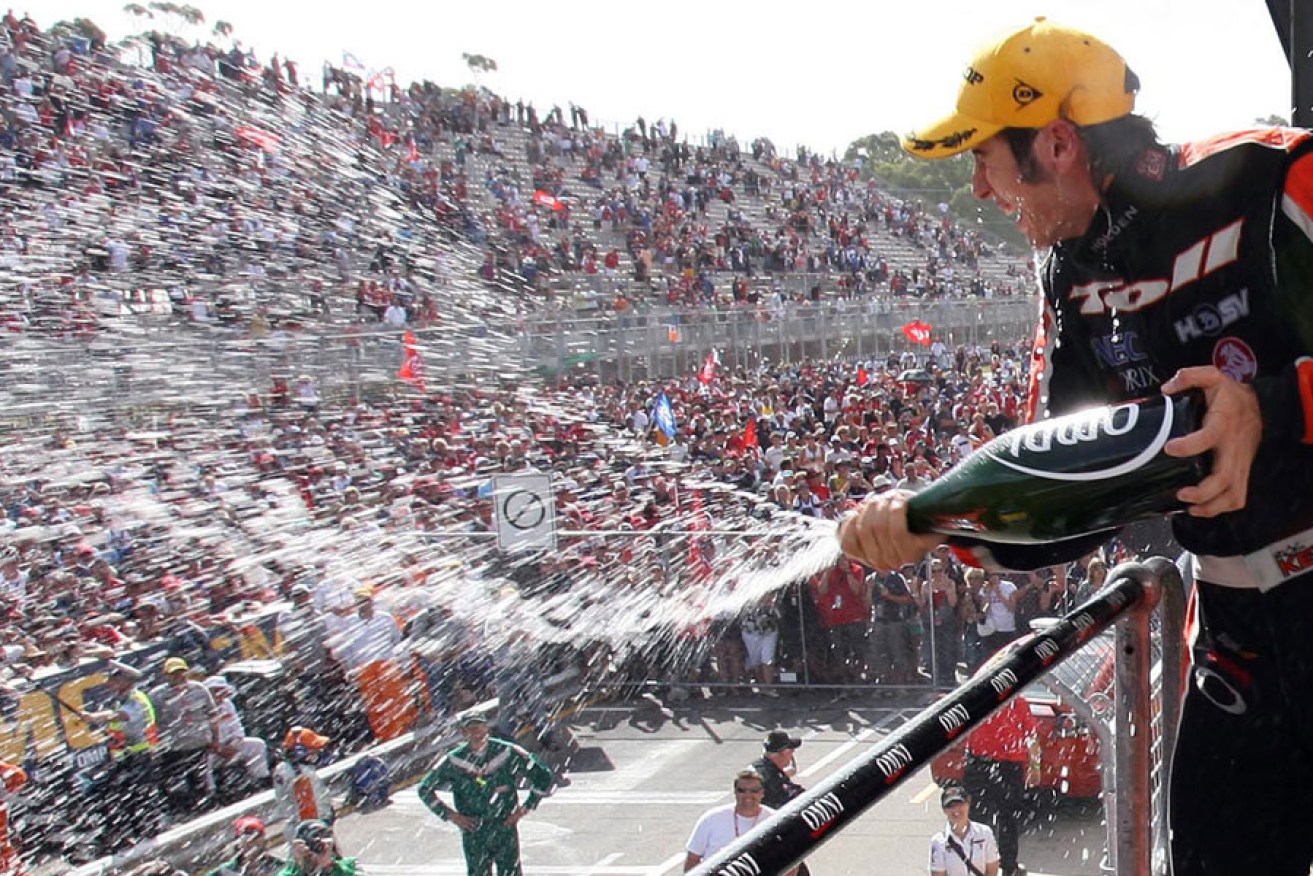Parklands panic comes round like clockwork


Good booze, bad booze: onlookers get an alcohol shower in the parklands after the Clipsal 500.
Here we go again – within sight of an Adelaide City Council election, suddenly we’re all worried again about drunk and disorderly behaviour in the parklands.
Of course, we’re not worried about all drunk and disorderly behaviour in the parklands – just some. Just by one group of Australians. You know what I’m saying.
We all laugh about the thousands of people who, every year without fail, spend the five days of the Adelaide Test match getting comprehensively sozzled “out the back” of the western grandstand, with some of them falling over, urinating in public and the like.
That’s hilarious and a tradition.
We shake our heads affectionately at the scallywags on end of season footy trips, gathered in swaying groups at any number of city pubs, braying like donkeys at any woman who happens to walk by (it happened at the pub near our office last week, as it does every single year).
Boys will be boys.
We politely ignore the concerns raised regularly in YWCA surveys about the behaviour of some Clipsal 500 attendees towards women in the city.
Feminists.
We hold our nose at the pungent combo of urine, beer and vomit that fills the alleys and car park stairwells near just about any city pub or nightclub (my regular choice of the day – the council-controlled car park stairwell that smells like a toilet, or the one that reeks of stale bong water and french fries?).
That’s life in the city.
WOMAdelaide covers the Botanic Park in a thick fug of wacky-tabaccee smoke each and every year – everyone sees it, everyone knows it, nobody cares.
Hippies are funny.
But a small group of Aboriginal people drinking and making small-time trouble in the south parklands? Well, that’s the end of civilisation and SOMETHING MUST BE DONE.
The problem isn’t new – nowhere near new. It’s been going on for decades – we just shift it around, wring our hands, and shift it around some more.
Twenty years ago the city’s “scandal” was public drunkenness in the squares, primarily Victoria Square.
A dry zone was introduced in 2001 which shifted Aboriginal drinkers from the squares to the parklands, and those who didn’t leave into the justice system.
A triumph of public policy.
I’m sure there are outbreaks of violence in the south park lands, confirmed by the Government today, and I’m sure residents and business people who live and work near the drinkers’ favourite spots have some unpleasant moments.
But introducing a dry zone will achieve absolutely nothing.
In 2012, the Adelaide City Council came under similar pressure to do something in relation to homeless people camping in the south parklands.
They introduced new guidelines to allow council workers to order the homeless to move on.
And what happened? The homeless did move on – into the side streets, stairwells and other sheltered places in the city proper and inner suburbs.
The net effect on homelessness was zero – or maybe even negative – as social workers found it more difficult to locate the people who needed their help.
A south parklands dry zone will have exactly the same effect, as pointed out by the minister responsible for liquor licensing, Gail Gago, in an interview today.
She told 891 ABC radio that “it is a very vexed issue and a really complex one and if there were simple solutions they would have been put in place and the problem fixed a long time ago”.
However, she indicated that the Government would consider introducing at least a partial dry zone – but probably not a 24-hour ban on drinking.
Everyone knows that what is really needed – what has always been needed – is effective, properly funded drug and alcohol services as part of a comprehensive suite of practical measures aimed at reducing alcohol dependency and improving the economic and social wellbeing of at-risk people in South Australia.
Instead, what we’ve had from the State Government has been a cut in funding for community health programs, many of which did important development work with vulnerable communities, including Aboriginal people.
The Adelaide City Council wants a blanket dry zone in a range of areas of the parklands, and you have to have a sliver of sympathy for them. They are under pressure from ratepayers to deal with an issue that is dependent on state-wide and national measures, and the council’s policy tools are limited.
But can we inject a degree of historical and social perspective into the issue?
Can we stop pretending that drug and alcohol abuse has its horrible apotheosis in the south parklands?
It’s a community-wide problem that happens in the parklands, at sporting events, in and around city pubs and clubs every night, and, perhaps most tragically of all, behind closed doors in “respectable” homes across Adelaide, the state and the nation.




